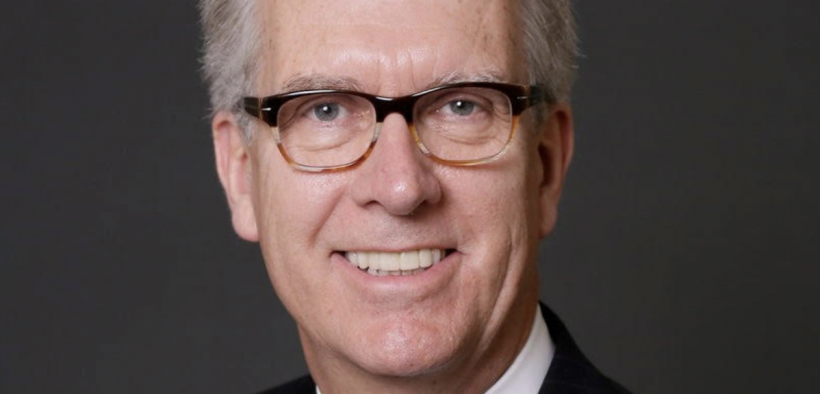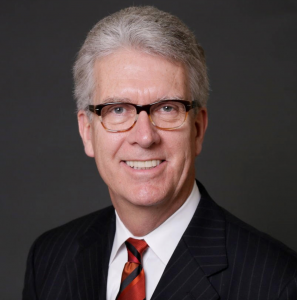Calvin Edwards Wants Ministries to Prove Their Lofty Claims

When Calvin Edwards left Australia for America at age 25, he already had a predilection for skepticism.

“I wasn’t given to just falling in line and believing people,” he said. “It was more like I wanted people to prove it.”
His skepticism only grew during the five years he ran Walk Thru the Bible’s publishing division. His work involved publishing partnerships with some 100 different Christian publishers and ministries, including the Navigators, Salvation Army, Chapel of the Air, Focus on the Family, Campus Crusade for Christ, now Cru, and even several churches—and he said he walked away the wiser.
“Working in ministries and with ministries, I realized many were not as well-run as I had naïvely thought in the early days of my career,” Edwards said. “Some of these ministries faced complex problems and issues, but the average donor didn’t have a deep knowledge of what ministries were dealing with. I remember making a mental list of good organizations where I would like to work, and I came up with a very short list, which bothered me.”
Edwards also served high-net-worth families while working with advisor Ron Blue, and his experience there gave him the idea that major givers would actually pay him money to do the kinds of due diligence, intense research, and analysis donors deserve.
He ran the idea by some friends, one of whom commissioned him to find a “blue chip homeless shelter” that was delivering demonstrable results. Following that meeting, Edwards quit his job at Ron Blue that afternoon so he could put his skepticism to work for the greater good by launching Calvin Edwards & Company. He declines to say how big the advisory company is today.
“The company was born of my naïveté, my thinking that ministries were fantastic and perfect, then realizing that they’re not, and coming to grips with that reality,” he says. “I felt led of the Lord to be a person that would stand in that gap between donors and nonprofits to provide sufficient information of the proper quality so donors could act in intelligent and strategic ways.”
Edwards says his company’s slogan, “Maximizing the Good of Giving,” suggests that all giving is good, but not all giving is equally good. “You can achieve more good by giving wisely, giving intentionally,” he says. “To do so requires more information, not scratching one’s head harder.”
Access to MinistryWatch content is free. However, we hope you will support our work with your prayers and financial gifts. To make a donation, click here.
The company maintains detailed profiles of some 2,000 nonprofits. “Basically, we’re vendors of information,” he says. Its strategic and operational audit of the prolife group Care Net is 55 pages long. It’s assessment of church planting group Operation Agape is 91 detailed pages.
Research shows some nonprofits solid, some troubled
Edwards doesn’t like to say, “I told you so,” but his company’s analysis has often warned of looming disasters and scandals that could have been prevented if ministries cleaned up their acts.
In 2012, concerned board members and donors of Teen Mania asked the company to analyze the fast-growing ministry. It found 32 significant problems and declared the ministry to be “functionally bankrupt.” Actual bankruptcy would follow in 2015, but founder Ron Luce continued to maintain the ministry’s “business model was sound,” and claim the only real problem was his passionate desire to reach more kids for Christ. Teen Mania closed down while still owing money to vendors, churches, and ministries including Compassion International, which sued Luce. Luce failed to show up for a Colorado court appointment. He has since launched a new youth ministry, Generation Next.
In 2005, a major donor who was being asked to join the board of Ravi Zacharias International Ministries asked Calvin Edwards & Company to take a look under the hood of that ministry. Research uncovered “multiple red flags” in management and finance that would ultimately lead to the ministry’s spectacular implosion last year following revelations of Zacharias’s long running sexual exploits, some of which were kept hidden by nondisclosure agreements.
“During the RZIM research, a senior staff person came to me and begged me to look at problems he had repeatedly reported, to no avail,” Edwards says. “The staff person hoped that if we reported on the problem, we would have more success correcting it than he had.”
In one case, research into a nonprofit revealed significant corruption and wrongdoing, leading Edwards to report the nonprofit to a state Attorney General for prosecution.
Often, research projects turn up positive results. Spoken Worldwide, a ministry that shares the truths of scripture through oral means, hired Calvin Edwards & Company to study a project that would distribute MP3 players to African villages that had no electricity so people could listen to Bible stories as well as humanitarian messages about health, water, AIDS, malaria, and child care.
Research teams made two trips to northern Kenya to work with the Samburu tribe. The first trip was a pre-test to evaluate tribe members’ understanding of the Bible and health messages before the MP3 players arrived. A follow-up trip four months later found that 75-80% of tribe members had listened to the players and retained some of the spiritual and health messages.
Next week, Edwards and company researcher James McGee travel to Albania to evaluate a pilot project operated there by World Challenge, the ministry that has taken over the international ministries formerly operated by David Wilkerson’s Teen Challenge.
“They want to make sure the project works before they roll out on a broader scale,” Edwards said.
Serving both donors and nonprofits
From 2001 to 2011, Calvin Edwards & Company served only donors, who often need help because: They often don’t know which questions to ask; they don’t have the time or expertise needed to carefully evaluate ministries; and they are often stymied by ministries that are either incapable of providing the information sought, or intentionally conceal it.
Edwards says he is concerned about a troubling trend: ministries registering as churches to avoid federal 990 reporting requirements.
He says “registering as a church may be appropriate in some unique instances,” but the loophole has been abused.
“It reduces what donors can do without the ministries cooperation,” he said. “So on the one hand, you have ministries saying please support us. But on the other hand, they’re saying we are no longer going to provide that information to you.”
But in 2011, the MacLellan Foundation urged the company to apply the same rigor to research conducted on behalf of ministries seeking to improve their work. Since then, the company has served both donors and nonprofits, but to avoid potential conflicts of interest, it informs clients of its relevant past work, and declines to do new work on both sides of the equation at the same time.
Edwards says he’s not sympathetic with critics of Donor Advised Funds or proposed legislation that would require DAFs to give away more money sooner. “I’ve never met a donor who says, ‘I want to park money.’ ”
“The real problem here is not on the supply side, with the supply of charitable funds locked up and parked in foundations,” he says. “The problem is on the demand side. There are billions of dollars in DAFs, but we don’t have organizations that are in need of, worthy of receiving, or capable of scaling up to receive that kind of gift. Christian ministries need to strengthen themselves and develop strategies for the possible deployment of larger sums of money.”



